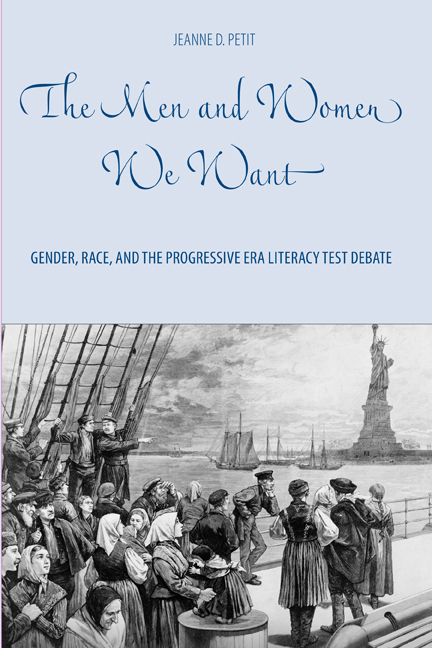Book contents
- Frontmatter
- Dedication
- Contents
- List of Illustrations
- Acknowledgments
- Introduction
- 1 Breeders, Workers, and Mothers: The Beginning of the Literacy Test Debate
- 2 Parents and Progeny: The Dillingham Commission Report
- 3 Muscle, Miscegenation, and Manhood: The Literacy Test at the Height of the Progressive Era
- 4 Practical Aid and Sympathetic Understanding: Grace Abbott's Alternative to the Literacy Test
- 5 World War I and the Literacy Test
- 6 The Legacy of the Progressive Era Literacy Test Debate
- Notes
- Bibliography
- Index
6 - The Legacy of the Progressive Era Literacy Test Debate
Published online by Cambridge University Press: 14 March 2018
- Frontmatter
- Dedication
- Contents
- List of Illustrations
- Acknowledgments
- Introduction
- 1 Breeders, Workers, and Mothers: The Beginning of the Literacy Test Debate
- 2 Parents and Progeny: The Dillingham Commission Report
- 3 Muscle, Miscegenation, and Manhood: The Literacy Test at the Height of the Progressive Era
- 4 Practical Aid and Sympathetic Understanding: Grace Abbott's Alternative to the Literacy Test
- 5 World War I and the Literacy Test
- 6 The Legacy of the Progressive Era Literacy Test Debate
- Notes
- Bibliography
- Index
Summary
When Prescott Hall died in 1921 at the age of fifty-four, Joseph Lee lionized his friend's single-minded drive for literacy test legislation. Hall, Lee maintained, stood at the forefront of the restriction movement from the first, and “the final success of the literacy test in 1917 marked the close of what must have been, I think, the longest legislative fight on record.” According to Lee, Hall had noticed “thirty years ago what others began to see during the war, that the most important question for this country was the kind of human material of which its future citizenship should be composed.” By forming the Immigration Restriction League (IRL) and tenaciously fighting to keep out southern and eastern Europeans, Hall had prevented the United States from becoming a “breeding ground for the defective and the oppressed—the beaten members of beaten races.” What motivated Hall, according to Lee, was “the love of country and the consideration for the future of mankind”
Prescott Hall and his colleagues in the IRL succeeded in seeing the literacy test bill passed, but they did even more than that. They changed the parameters of the debate by framing the consequences of immigration restriction in terms of race, gender, and sex. What kind of men and women, they asked, were racially worthy to become part of the nation's population and breed its future citizens? By the 1920s, this question had become central in American political discourse. Groups that opposed the literacy test, such as the American Association of Foreign Language Newspapers (AAFLN) and the Immigrants’ Protective League (IPL), were forced to confront the IRL's question and, in doing so, they offered new possibilities for thinking about American men and women, and white identity. The men of the AAFLN made the case that southern and eastern European immigrants were safely white because of the manly traits they exhibited, such as strong bodies and the ability to fight the nation's wars. These traits, as well as their whiteness, also made these immigrants desirable breeders of the nation's future citizens. The AAFLN imagined a nation where all European nationalities could be collapsed into the category of “white,” and all white men, whether industrial laborers or college professors, would be seen as equal citizens, with the freedom to work, live, and marry as they pleased.
- Type
- Chapter
- Information
- The Men and Women We WantGender, Race, and the Progressive Era Literacy Test Debate, pp. 128 - 138Publisher: Boydell & BrewerPrint publication year: 2010

